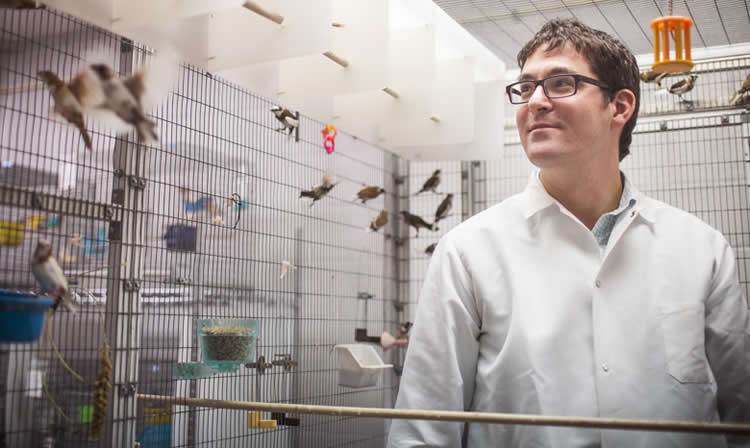Experiments are the first to isolate the role of dopamine in sensory-motor learning.
The neurotransmitter dopamine is essential to correcting vocal mistakes, suggests a study on Bengalese finches. The Journal of Neuroscience published the research, led by Emory biologist Samuel Sober, who uses Bengalese finches as a model to understand how the brain learns.
“Our experiments are the first to isolate the role of dopamine in sensory-motor learning, as distinct from the other functions that dopamine performs in the brain,” Sober says. “Bengalese finches are songbirds that have extremely precise singing behavior and can also refine their songs in response to auditory feedback. This provides a way for us to understand similar patterns of learning in humans. The ability to use auditory feedback to fix errors in behavior underlies everything from learning to speak, to sing and to play an instrument.”
The research found that a reduction in dopamine levels in a small region of the basal ganglia in the finches’ brains caused a reduction in their ability to correct vocal errors, while having no detectable effect on their ability to sing. The basal ganglia is situated at the base of the forebrain and is associated with a variety of functions, including voluntary motor movements and procedural learning.
“Some neurons send messages to the basal ganglia using dopamine,” Sober explains. “These dopamine-containing cells are some of the same neurons that slowly die off over years in patients with Parkinson’s Disease, and problems with vocal control are often observed in Parkinson’s patients. We hope that our research may help with the understanding of the role of dopamine in vocal behavior and the development of potential therapies for learning deficits.”
A great deal of scientific literature already exists on the role of dopamine in learning to associate a stimulus with a reward or a punishment. What’s much less understood is how dopamine may play a role in learning to perform a skilled behavior, such as speaking.
To conduct the experiments on the Bengalese finches, the researchers first recorded each bird singing while an occasional blast of white noise was emitted from a speaker near the cage when the bird sang within a particular range of pitches. “The finch interprets this blast of noise as an error,” Sober explains. “We measured how fast each bird changed its pitch to avoid that noise.”
A drug was then administered to the birds to lower the dopamine levels in their basal ganglia by about half and their singing was once again recorded. “We found that their ability to correct their singing in response to the white noise also went down by about half,” Sober says. “They were still able to learn from the white noise ‘mistake,’ but they were significantly worse at it.”

While the experiment demonstrates that dopamine is necessary for processing vocal errors, many questions remain. “We don’t know if reducing the level of dopamine changes the birds’ ability to detect a vocal mistake, or whether it just affects their ability to fix mistakes once they detect them, or perhaps both,” Sober says. “Our next step is to better understand, at the cellular and molecular level, how changes in dopamine affect activity in the basal ganglia.”
Co-authors of the study include Emory post-doctoral fellow Li He and graduate students Lukas Hoffmann, Varun Saravanan and Alynda Wood.
Funding: The research was funded by the Morris K. Udall Center of Excellence for Parkinson’s Disease Research at Emory, part of a network of centers managed by the National Institutes of Health to foster research into the causes and possible treatments for Parkinson’s Disease, and by the National Institute for Neurological Disorders and Stroke.
Source: Carol Clark – Emory Health Sciences
Image Source: The image is credited to Emory University.
Original Research: Abstract for “Dopaminergic Contributions to Vocal Learning” Lukas A. Hoffmann, Varun Saravanan, Alynda N. Wood, Li He, and Samuel J. Sober in Journal of Neuroscience. Published online February 17 2016 doi:10.1523/JNEUROSCI.3883-15.2016
Abstract
Dopaminergic Contributions to Vocal Learning
Although the brain relies on auditory information to calibrate vocal behavior, the neural substrates of vocal learning remain unclear. Here we demonstrate that lesions of the dopaminergic inputs to a basal ganglia nucleus in a songbird species (Bengalese finches, Lonchura striata var. domestica) greatly reduced the magnitude of vocal learning driven by disruptive auditory feedback in a negative reinforcement task. These lesions produced no measureable effects on the quality of vocal performance or the amount of song produced. Our results suggest that dopaminergic inputs to the basal ganglia selectively mediate reinforcement-driven vocal plasticity. In contrast, dopaminergic lesions produced no measurable effects on the birds’ ability to restore song acoustics to baseline following the cessation of reinforcement training, suggesting that different forms of vocal plasticity may use different neural mechanisms.
SIGNIFICANCE STATEMENT During skill learning, the brain relies on sensory feedback to improve motor performance. However, the neural basis of sensorimotor learning is poorly understood. Here, we investigate the role of the neurotransmitter dopamine in regulating vocal learning in the Bengalese finch, a songbird with an extremely precise singing behavior that can nevertheless be reshaped dramatically by auditory feedback. Our findings show that reduction of dopamine inputs to a region of the songbird basal ganglia greatly impairs vocal learning but has no detectable effect on vocal performance. These results suggest a specific role for dopamine in regulating vocal plasticity.
“Dopaminergic Contributions to Vocal Learning” Lukas A. Hoffmann, Varun Saravanan, Alynda N. Wood, Li He, and Samuel J. Sober in Journal of Neuroscience. Published online February 17 2016 doi:10.1523/JNEUROSCI.3883-15.2016






